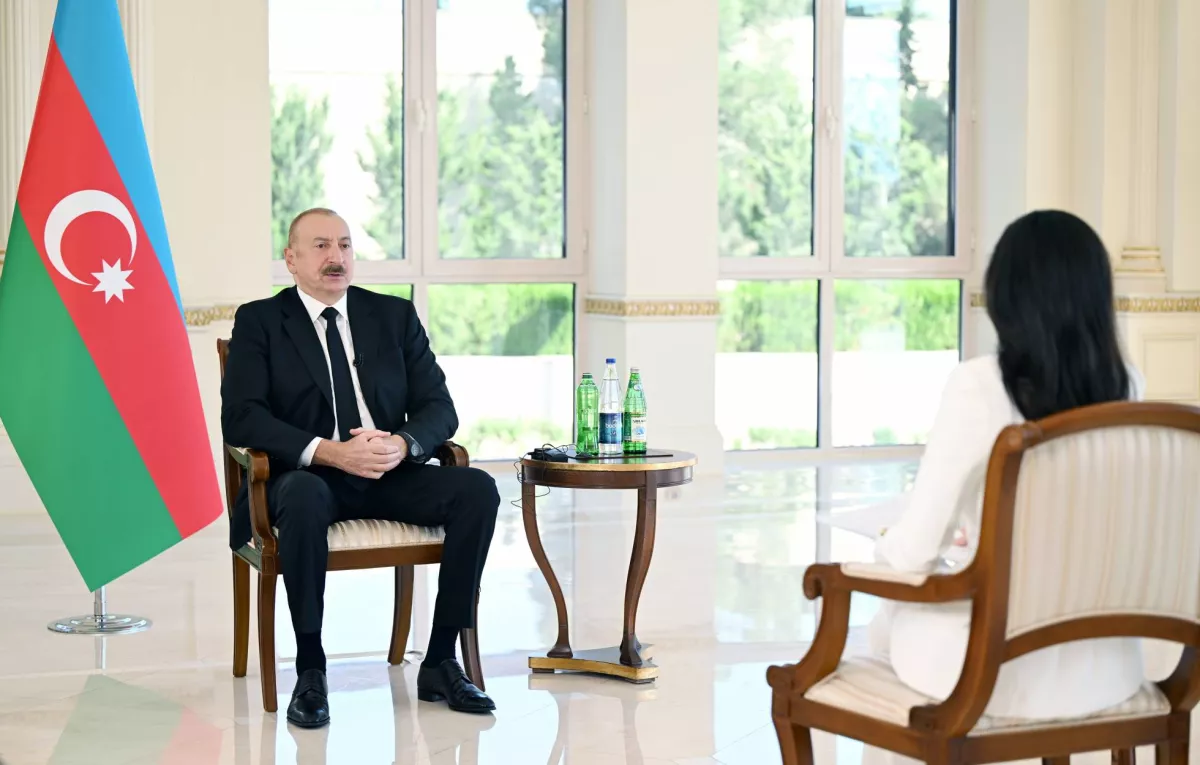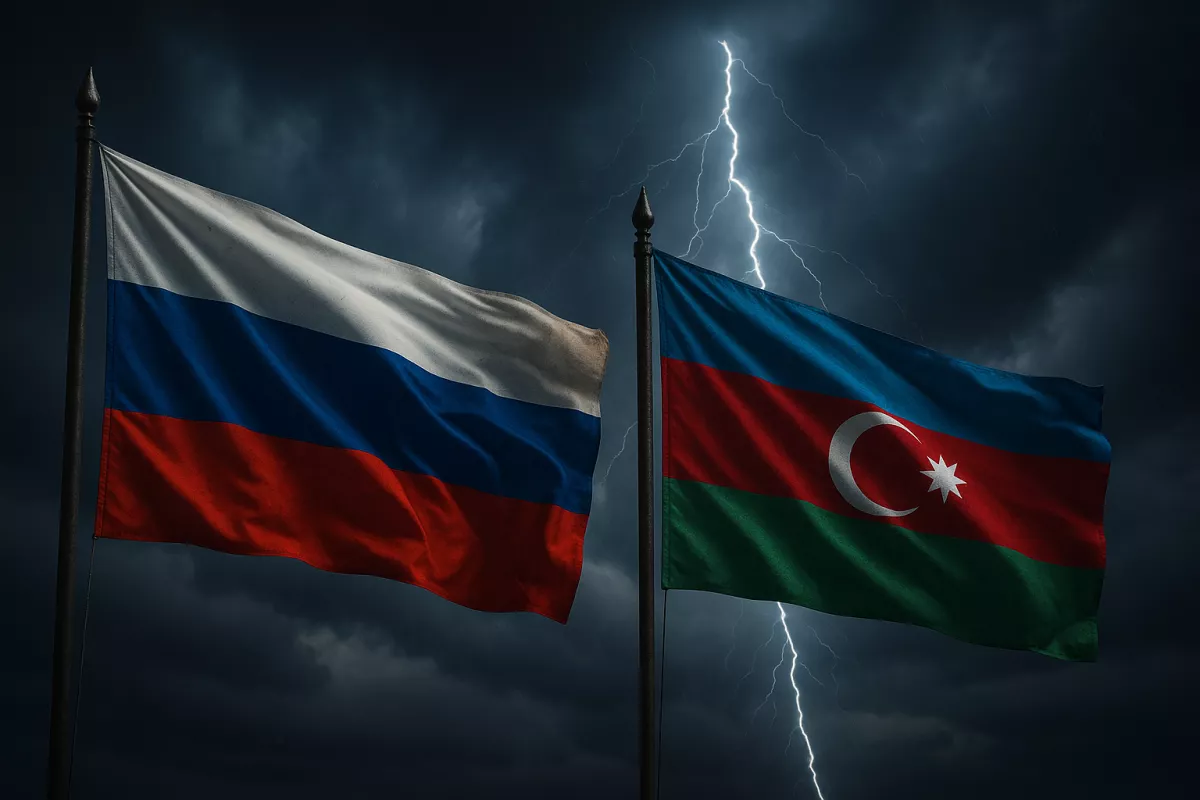Apologies without remorse, investigation without end The AZAL plane crash through the lens of Russian propaganda
The tragedy involving an Azerbaijan Airlines (AZAL) aircraft on December 25, 2024 dealt a heavy blow to Azerbaijan. The plane was shot down by Russian air defence over Grozny. The crew managed to reach Kazakhstan, where the out-of-control aircraft crashed near the city of Aktau. On board were 62 passengers, including 37 citizens of Azerbaijan, 16 of Russia, 6 of Kazakhstan and 3 of Kyrgyzstan, as well as five crew members. The crash claimed the lives of 38 people, while 29 survived, including three children.
Immediately after the disaster, Russian officials and experts began actively commenting on the situation, offering their own interpretations of events. In the Russian media space, there were numerous attempts to shift responsibility, with versions put forward about technical malfunctions, a “bird strike,” an “oxygen cylinder explosion,” and so on. Caliber.Az has repeatedly analysed in detail the many fakes and manipulations surrounding the causes of the AZAL plane crash. But today it is important to focus on two arguments that Moscow most often resorts to: first, “But Putin apologised, what more do you want?” and second, “The investigation has not been completed, so it’s too early to draw conclusions.” Upon closer inspection, neither of these arguments holds up to factual scrutiny.
Let us start with the issue of apologies. According to the Kremlin’s official release of December 28, 2024, Vladimir Putin, in a telephone conversation with Ilham Aliyev, “extended his apologies in connection with the fact that the tragic incident occurred in Russian airspace.” This wording immediately drew attention. Putin apologised not for the actions of the Russian military, but merely for the fact that the incident took place in Russian territory.

If we turn to international practice, there is more than one example of states and their leaders acknowledging responsibility for such incidents. Let us focus on just one, since it occurred in our region and relatively recently. On January 8, 2020, Iranian forces mistakenly shot down Ukrainian flight PS752. In the first days, Tehran denied any involvement. But just three days later, under the pressure of evidence, the Iranian authorities officially admitted that the plane had been downed by an air defence missile. Iran’s President Hassan Rouhani apologised to Ukraine’s President Volodymyr Zelenskyy for the missile strike on the Ukraine International Airlines passenger jet, which killed 176 people, including Ukrainian citizens. The Iranian president assured his Ukrainian counterpart that those responsible would be held accountable.
Moreover, four days later President Rouhani apologised once again, this time for the authorities’ delay in announcing the responsibility of Iran’s military for the downing of the Ukrainian Boeing. Nor did Iran stop there: without waiting for the completion of an investigation that could have dragged on for years, it announced in advance the payment of compensation and conducted trials of the military personnel involved in the tragedy.
Hossein Salami, who then commanded the Islamic Revolutionary Guard Corps, also apologised for the mistakenly shot-down Ukrainian plane: “I have never felt so ashamed in my life. We made a mistake. We ask for forgiveness.”
Meanwhile, at the time the commander of the IRGC Aerospace Force, Brigadier General Amir Ali Hajizadeh, was even more emotional: “We accept full responsibility and are ready to follow any orders issued by the country’s authorities. I wanted to die when I heard about the crash of the Ukrainian plane, so as not to witness this tragedy.”
As we can see, Iran’s actions complied not only with international norms but also with principles of humanity: acknowledgement of the fact, apology, compensation and legal accountability.
A similar approach was demonstrated by Azerbaijan itself. On November 9, 2020 at 18:30, a Russian Mi-24 military helicopter was shot down in the Nakhchivan section of the Armenian–Azerbaijani border, resulting in the deaths of two servicemen and injuries to another. It should be recalled that active hostilities were still ongoing, and the helicopter was approaching the country’s borders from the Armenian side. Yet Baku did not attempt to stall for time or blame the incident on the circumstances of wartime. No, Azerbaijan acted honestly, appropriately, and as befits a normal state.
On November 10, President of Azerbaijan Ilham Aliyev called President of Russia Vladimir Putin and extended condolences over the tragedy of the downed Russian Air Force helicopter. Aliyev apologised for the tragic mistake, noting that in the darkness the helicopter had been mistaken for an Armenian Air Force aircraft. The president asked that condolences be conveyed to the families and relatives of the deceased and wished the injured pilot a speedy recovery. The President of Azerbaijan also expressed readiness to provide compensation to the families of the victims and the injured pilot. Aliyev further informed Putin that the Office of the Prosecutor General of Azerbaijan had opened a criminal case.

In his recent interview with Al Arabiya TV, President Aliyev once again touched upon the situation with both the downed Russian helicopter and the Azerbaijani Embraer.
“We immediately paid compensation to the families of those who were killed—the pilots—and to the Ministry of Defense. We started an investigation, and those who made that tragic mistake were brought to justice. We haven't seen anything of that sort from the Russian side. That tragic event on November 9, and the way we conducted ourselves, made us fully prepared to expect the same attitude toward Azerbaijan — especially since the two countries call themselves friends. But that was a big surprise. Until now, they have not said what happened,” President Aliyev said.
The second argument promoted by the Russian side concerns the investigation. Moscow claims: “The investigation has not been completed, and therefore it is too early to draw conclusions.” Formally, this is true: Russia’s Investigative Committee opened a criminal case under Article 263 of the Russian Criminal Code (violation of the rules of traffic safety and operation of air transport). The Russian side stated that preliminary investigative actions are being carried out, with both civilian and military experts being questioned.
But does this really prevent them—if not on a legal level, then at least on a political one—from acknowledging the obvious, namely the fuselage of the Azerbaijani civilian aircraft riddled with shrapnel from a Russian Pantsir missile? Is it really necessary to wait for the final report in order to call things by their proper names?

Moreover, there is still no clarity as to what stage the investigation is at — or whether it is even being carried out at all, or instead being quietly shelved. In this context, the words of Azerbaijan’s Prosecutor General Kamran Aliyev are telling: the Russian side has not provided Baku with information on the concrete results of the investigation into the downing and crash of the AZAL plane in Aktau.
“They have not yet provided us with specific results of the investigation, citing ongoing expert examinations, continued inquiry, and investigative procedures. However, from the very beginning of the investigation we have had sufficient evidence ourselves. We are well informed about the circumstances of the incident and have gathered all the necessary proof,” the Prosecutor General stated in July this year.
Thus, both arguments put forward by the Russian side — the so-called “apology” and the “ongoing investigation” — are nothing more than convenient manipulations. The first is a substitution of concepts. The second is an attempt to evade responsibility.
Against this backdrop, Russia’s formula of “apologies” in the case of the AZAL flight appears half-hearted. It lacks the key element — the recognition of a causal link between the actions of the Russian Armed Forces and the catastrophe. Hence the natural question: can such “apologies” be considered sufficient? For the families of the victims and for Azerbaijani society, the answer is obvious — no. What we see from the Russian side is not honesty, but hypocrisy and cynicism. And all the statements of Russian propagandists that “Putin has already apologised” and “the investigation is not yet complete” are a vivid confirmation of this.
One wonders: would they accept such “apologies” if it were their loved ones and a Russian plane involved?








